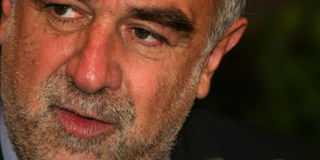Ocampo: ICC has strong case in Kenya chaos

ICC Prosecutor Luis Moreno-Ocampo addresses a press conference at Windsor Golf Club in Nairobi on November 7, 2009. He said Kenya has a strong case against suspects of the post election violence. Photo/STEPHEN MUDIARI.
What you need to know:
- ICC prosecutor vows to end impunity for most serious crimes.
- Mr Ocampo says Pre-Trial Chamber already constituted.
The International Criminal Court Prosecutor has said he has a strong case against Kenya’s post election violence suspects.
"I think I have a strong case because the Waki commission is a very good report, it's full of information and there are other reports; the UN report, different other human rights groups reports, I believe I have a very strong case," said Mr Luis Moreno Ocampo at a news conference at the Windsor Golf and Country Club, Nairobi on Saturday.
He also said he was confident of getting The Hague backing to open investigations into the violence and if it does so "the Prosecutor will ensure that the investigation proceeds expeditiously," adding that the Pre-Trial Chamber was constituted on Saturday, just a day after he announced his intention.
He said that he already has in place a team of investigators, including lawyers and international cooperation advisers.
But he added that while he will consider the Waki Report, he was not bound to it as he "has a duty to conduct an impartial investigation; this is why the names suggested by the Waki Commission are not binding to him."
Mr Ocampo said he will "prosecute those who bear the greatest responsibility for the most serious crimes."
He also vowed to end impunity.
“My mandate is to end impunity for the most serious crimes. I will do that.”
He said that doing so will allay Kenyans fears of a repeat of violence in the 2012 elections since “everyone is worried about the next election in Kenya.”
The Prosecutor said that once the judges give him the go ahead to open the probe he will visit Kenya to meet the victims as a way of building his case on crimes against humanity, the “widespread and systematic attack on the civilian population.”
He said he will build his case based on between 25- 30 witnesses adding that the investigations may take at least six months.
"As soon as the Judges authorise the investigation, the Prosecutor will return to Kenya to visit the sites where crimes were committed and to meet with the victims.
"In accordance with the Rome Statute, the victims of the crimes have a role during the proceedings. They can present their views and concerns and they can request reparations."
The ICC Prosecutor said should he get authorisation to start a probe he will be presenting a few cases.
"The Prosecutor will present in Court a limited number of cases, 2or 3, against those persons considered the most responsible. Only some of the gravest incidents will be presented at trial," said Mr Ocampo.
After gathering enough evidence, he will go to the Pre-Trial Chamber to request summons or warrant of arrest.
"This would be the moment that the names of persons who have to face justice will be revealed, not before."
The Summons to Appear can only be issued if the perpetrators of the violence will not seek to evade justice.
"If the Prosecutor considers the persons will not try to escape justice, that they will not destroy evidence or threaten witnesses, he can propose that the Pre-Trial Chamber issue a Summons to Appear, under which the person appears voluntarily before the Court," he said. He gave the example of Darfur rebel leader Abu Garda, who appeared voluntarily.
Mr Ocmapo expressed confidence that Kenya will arrest the post election violence suspects if called upon because it "is a well organised state."
Mr Ocampo, who jetted into the country on Thursday to meet President Kibaki and Prime Minister Raila Odinga over the post poll violence, left for South Africa after the media briefing.
His meeting with the two principals on Thursday yielded little, after the two leaders declined to hand over the case to the ICC. This left the Prosecutor will no option but to take over the case.
However, the government agreed to cooperate fully with the ICC in case it takes possession of the case.
The government has, on several occasions, failed to meet the deadline for forming a Special Tribunal to try the post election violence suspects locally, the latest being September 30.
The chaos that followed a disputed presidential election in 2007 left at least 1,300 and another 650,000 displaced from their homes.
The two months of violence ended after former United Nations secretary general Kofi Anann brokered a peace deal that saw Mr Kibaki and Mr Odinga agree to form a power-sharing coalition government.




